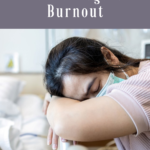
Caregiver burnout is what the name suggests. It’s where you’re exhausted, overwhelmed, and at the end of your rope. Where it feels like you have nothing left to give and the prospect of keeping going day after day feels almost impossible.
And yet, stopping often isn’t an option. Your parent, spouse, or other loved one still needs care. They’re still struggling.
Some caregivers choose to push through. To keep going without changing anything, perhaps because it seems like they have no choice. But, this isn’t sustainable.
Sooner or later you’re going to crash and you’ll probably crash hard. That’s awful for you and the person you’re caring for.
So today, we’re looking at how to recover from caregiver burnout.
Specifically, how you can start to heal and do better while still supporting your loved one. After all, for most caregivers, stepping away and fully recouping just isn’t an option (if doing so was possible, you would probably have done it already).
Why Burnout Is So Serious
Burnout can be defined as “a debilitating psychological condition brought about by unrelieved stress”.
It’s a real thing and a scary one.
When you’re completely burned out, it becomes difficult or completely impossible to support anyone else. Often even meeting your own needs becomes overwhelming.
I’ve seen that in myself. When I’m burned out, I look for shortcuts everywhere. That often means less exercise, eating badly, and turning to comfort food.
It’s easy to see how that’s a problem.
The longer you don’t take care of yourself, the more problems you face. Plus, things can quickly snowball and get progressively worse.
It doesn’t just affect you either. Burned out caregivers struggle to care for their loved ones. They’re more likely to make poor decisions, to become resentful, or to be angry.
Indeed, everything about the quality of care you provide may decrease.
Symptoms Of Caregiver Burnout

Burnout is clearly significant. So, how do you tell when it’s affecting you?
After all, some level of stress is a normal part of being human. Some people also provide care for years without it being overwhelmingly difficult.
Here are some key signs to watch out for:
- Consistently low energy and a regular sense of fatigue
- Getting too much or too little sleep
- Losing interest in activities that you previously loved
- Increased irritability, often over minor things
- A sense of hopelessness
- Anger or resentment
- Regularly ignoring your own needs
- Increased physical health problems
- Strong emotions, which can sometimes lead to emotional outbursts
Your workload is a key indication too. If you never have time for yourself and a constantly juggling schedules, you’re probably burned out or well on your way.
Are You In Denial?
Some caregivers actively deny the amount of stress they face and how much they struggle. They put a brave face on, day after day, refusing to recognize that their workload isn’t sustainable.
Is this you? Daily Caring highlights a few key indications that you’re in denial.
How You Can Recover From Caregiver Burnout
In an ideal world, you’d step away from caregiving for a while. Someone else would take over and you could simply rest. Perhaps you’d even go to a retreat for a while. Have the time to find yourself again and have a real break.
This isn’t an ideal world, though.
If it were, you wouldn’t be overwhelmed and burned out. You would never have been under enough pressure to get here.
So, we’re not going to look at ideal solutions.
We’re more interested in what’s realistic, especially if you’re still in the middle of a situation that’s wearing your out and stepping away isn’t an option.
Change Your Approach
Burnout normally happens because you’re trying to do too much.
Regardless of the situation and your loved ones’ needs, you’re pushing yourself too hard. Your body and your mind simply can’t cope.
You have to find a way to do less.
This often involves setting boundaries and seriously thinking about what needs to be done versus what doesn’t.
Here are some useful starting points:
- What tasks are truly necessary? These are often things that your aging parent can’t do for themselves or can’t do safely.
- What tasks aren’t essential, but still very important? For example, an aging parent might theoretically be able to catch a taxi, but that mightn’t be wise if they are easily confused or highly anxious.
- What tasks are less critical? Many tasks won’t fall into either of the previous categories. They’re often things that make the senior’s life a little easier, but that’s it. These are areas that you can safely cut down on.
- Why do you help where you do? Some caregivers do too much because their parents are demanding. Others create the work for themselves, sometimes because they’re seeking approval. This is why it’s so important to think about what’s actually needed.
- Where can other people help? This includes other family members, your aging parents themselves, government programs, senior centers, and anywhere else you can think of. There are sources of support out there, more than you might expect..
Put The Consequences On Them
I saw this phrase on the AgingCare forums when members were talking about boundaries.
It’s a useful approach.
For example, say your aging parent called with half an hour’s notice because they have a doctor’s appointment that they forgot about.
Many caregivers would drop everything and rearrange their schedule to get them to the appointment on time.
Putting the consequences on them means saying no. It’s not your fault that the senior forgot to tell you about the appointment.
Making the senior face consequences rather than picking up the slack often helps them to be more responsible. It also gives you more time for your own life and your own needs.
That’s crucial.
Obviously, some wisdom is needed.
The goal is to allow your parent to deal with the consequences when doing so is safe, where you’re not putting them at risk.
Make Many Small Tweaks

It’s tough to make dramatic changes as a caregiver. But, small ones? Those are much easier.
Take a close look at your life and situation, and think about what’s in your power. What changes can you make?
These could be tiny things, like using a prepared sauce packet to save you a few minutes when cooking or being less rigorous when you clean. Or, starting to say no to some requests.
You can also look for small self-care things you can do for yourself, like a brief meditation or using an app like Calm. The changes you make mightn’t seem like much, but they add up.
Plus, as you start to do more for yourself, you get into the rhythm. It gets easier to be aware of your needs and to address them.
Focus On What’s Essential
Being able to recover from burnout may involve paring things right down.
This could involve cutting out every non-essential aspect of caregiving for a while and giving yourself as much of a break as possible.
I sometimes use the term ‘guarding my energy’ for this.
Think of it this way… when you’re recovering from an illness, your body needs more rest and more resources than normal. If you don’t slow down enough, healing takes much longer. You mightn’t even fully recover.
The same is true for burnout.
You need to cut down more than you might expect to recover, as your body has few reserves left.
What you cut down will depend on your situation, your priorities, and what takes the most energy.
Here are some questions to think about:
- What isn’t essential right now? What can be put on pause for a while?
- What drains me the most?
- What energizes me the most?
- What can I get help with?
Get Help
Many caregivers despair at the idea of finding help. Doing so often feels completely impossible.
Yet, there are options.
Sometimes the solution is as simple as stepping back and allowing other people to fill the gaps. Or, if you step back, you might realize that some of what you’ve been doing wasn’t that essential after all.
Here are some areas to think about and research.
- Getting support from family members. Even if they’re not willing to help with caregiving, perhaps they can support in other ways, like financially or with practical tasks.
- Respite care is often an option for short-term relief.
- There are home healthcare services too, which may be funded through Medicaid.
- Local volunteers may also help, particularly with providing meals, companionship, or transportation.
- Local senior centers and other organizations may offer adult day programs. These get the senior out of the home for a while, giving you the chance to pursue your own interests.
- Look at hiring someone. Hiring a caregiver is the most obvious approach, but you could also simply hire someone to help you clean. While it’s easy to say this costs too much, sometimes that’s a false economy. Stress is expensive too. Things that help to lower your stress could easily save you money in the long term.
Find What Sparks Joy
What makes you happy? Finding sources of joy isn’t just relevant for burnout. Doing so can make your caregiving journey less overwhelming as well.
There are two approaches here.
New Things
One is to add more things into your life, the things that matter to you.
This may take a little work. If you’ve been a caregiver for a while, it’s easy to almost lose track of yourself. To forget the things that matter to you.
Or, you may need to look at things differently. After all, you need things that are feasible in your current situation. I’ve found values work to be an incredibly good starting point, as this helps to highlight the areas that mean a lot to me. You can then combine your values with brainstorming to find things that help you.
For example, music and movement mean a lot to me.
So, I’ve started to find ways to engage with this more. Sometimes that’s as simple as bopping to imaginary music for 20 seconds or blasting a song and dancing along to it.
Joy Within The Situation
I know… I know… this one might sound impossible.
It’s not though – and it’s a powerful idea.
One trick is to look small. Rather than looking at the big picture and all the challenges, focus in on the little moments and look for the beauty.
The beautiful moments might be hard to find at first, but the more you look for them, the easier it becomes. Even if they’re few and far between, the little moments of joy make everything a bit brighter.
Some caregivers do this by leaning into humor, particularly during difficult situations. Why not have a little fun when everything is a bit overwhelming? Besides, many aspects of caregiving are pretty hilarious when viewed through the right lens.
Finding joy doesn’t mean pretending that everything is rosy. Far from it. It’s still crucial to acknowledge the difficult side of things.
If you find this distinction challenging, try looking into self-compassion. This is a powerful way to support yourself regardless of what else is going on.
Connect With Others
Isolation is a common problem for caregivers. It often gets worse during burnout, as you don’t have the energy to seek out connections.
Yet, loneliness can harm you in many ways. You need regular social contact. This is what makes you resilient to everything else..
Forums are a good starting point, as these help you connect with other caregivers. But, you’re going to need in-person connections too. Some of these could come through a support group, while others might be associated with a club or some type of regular event.
Finding good connections takes time and may be a little frustrating. Still, this is too important to give up on.
Find Ways To Improve Your Health
Dealing with health might seem impossible if you’re already stressed and overwhelmed. But, doing so is also essential.
Look for small changes that are realistic. Like drinking water and little bursts of exercise (dancing when cleaning, even). Get enough sleep. If a full unbroken night isn’t possible, look at alternate sleep schedules or napping.
Consider Counseling
There’s also therapy. This might seem like an odd choice, but it can really help.
For one thing, a counseling session gives you the chance to talk about the situation with someone who isn’t going to judge and isn’t personally invested.
Therapists can also help you make sense of the situation and your own reactions. Some may even be able to help you to find new solutions and understand your current approaches. This is particularly important if you’re doing too much for your parent and don’t fully understand why.
Besides, therapy isn’t just for people struggling. It has benefits for everyone.
Protecting Yourself In The Future
The approaches we’ve talked about today are all important for protecting you in the future as well.
Being wise about what you commit to and your own energy levels can help to keep you stable, which reduces the risk of burnout.
And seriously, this is important.
Self-care does get easier once it becomes a habit and you find a rhythm with it. Having this in place becomes crucial for your long-term health.
Final Thoughts
Recovering from burnout while still providing care isn’t easy. It’s best to take things gradually, one step at a time, and be kind to yourself.
You won’t come back to full strength overnight. It could easily take months or longer for your energy levels to return. You might even need to be cautious for a year or more.
If you find it difficult or impossible to put these steps in place or find that your symptoms aren’t getting better – you may need to seriously think about whether caregiving is the right approach.
Despite how it may feel, caregiving is rarely completely essential. If you don’t provide care, state programs will often step in or others will start to help.
In fact, sometimes meeting the senior’s every need isn’t good for them either. Doing so simply makes them overly dependent, which could cause long-term health problems. In those cases, stepping back doesn’t just help you recover from caregiver burnout, it also helps them to become more independent.
Feeling Overwhelmed?
Check out our Caregiving Consulting service for personalized support and guidance.


Leave a Reply